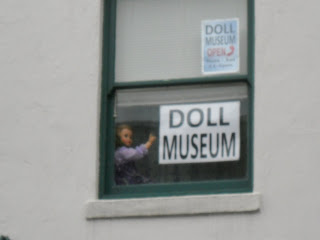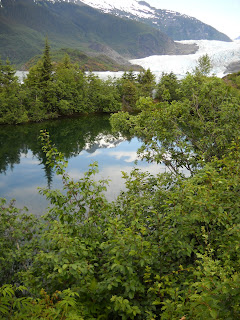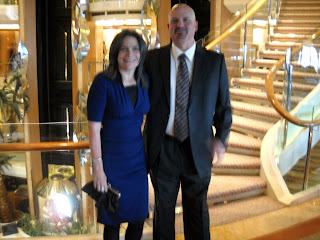Day 7
Two-mile jog at 5:30 (am!) to watch our entry into Tracy Arm, a waterway that runs past Sawyer Glacier.
A naturalist on the bridge broadcast observations. I saw glacial valleys, crevasses, morains. The water was an eerie, Caribbean blue despite the cloudy skies.
I learned that the glacier’s blue color comes from the fact that glacial ice is so compressed—10 times as dense as the ice in your freezer—that the only light that can escape from it is from the blue end of the spectrum.
I learned that ice floes with areas greater than 15 feet are icebergs, while those with slightly smaller areas are called bergie bits (a scientific term), and those yet again smaller are called growlers.
After breakfast, Robert and I went down to the Promenade deck and camped out for an hour. It was bitterly cold. An attendant strolled by with a cart from which you could purchase Irish coffee. Robert considered it but ultimately said no to the invitation to liquor up at 8:30 am. We watched for Dall sheep, whales, and bear but didn’t see any. I did spot an eagle on an iceberg and several flocks of terns. Another attendant pushed a cart selling Nikons. No one thought to sell blankets, which I would have bought.
Outside of Tracy Arm, we sailed through Frederick Sound. Fog sat heavily on the coast, casting everything in eerie gray light.
It began to clear a little. Water like smoky glass, still and waveless. Right in front of one of the Brother Islands, I saw a whale breech. Far away but beautiful. Five minutes later, another one with his tail in the air. The naturalist pointed out that humpbacks eat 1,000 pounds of fish a day, so it is more efficient for them to travel alone. Pods are rare.
Spent the afternoon in the Wheelhouse Bar, reading WE WERE THE MULVANEYS. Loving it right from the start although, having read Oates before, I keep waiting for something grisly to happen every time I turn the page. I finished THE HOUR I FIRST BELIEVED yesterday. It is a vast, messy novel, and I’m not sure how I feel about it. It is trying to say so many things, and some of it seems not to hang together well. Also, I don’t like Lamb’s tendency to end sentences with ellipses: it is weak and amateurish. Robert is reading (at my suggestion) THIS MUCH I KNOW IS TRUE, and I am surprised at how similar the plots are. Several of the minor characters in THE HOUR first appeared in THIS MUCH, which I think is a nice touch.
Relaxing in our room at about 4:15, marveling at all the colors of gray—gunmetal, charcoal, silver, pewter—in the sky and sea and distant coastline, when we saw a whale blowing water and flashing his tail, and then another, and another. Clearly a group of whales—is every group a pod? I don’t know, but it was thrilling. We were in the Gulf of Alaska, just about to head past Coronation Island. Maybe this is where they congregate.
Evening was fine: delicate sunlight, a fragile blue sky. We had drinks (me: champagne; Robert: Irish coffee) at Crooners, then met Roy and Josie for dinner. Now watching “Oceans 12” in our room. Outside, the ocean is gray and glassy. No sign of whales, but I know they are there, steering clear of us, frolicking in our wake.
Day 8
TV on-board ship is repetitive and pretty mindless, except for CNN International, although it seems that every time I turn it on, I get Piers Morgan interviewing Ryan O’Neal. Still, it’s better than the movies (“The Proposal,” “Eat, Pray, Love,” some ghastly thing about Goya with Natalie Portman being tortured by Javier Bardem) or, worse, the shipboard stations, most of which are meant to sell you something. I like the map that lets you know where we are and the web-cam at the front of the ship. But I could do without the porn-movie sax accompaniment.
Robert has a cold, so now I’m trying to avoid that and the norovirus.
It’s Sunday, but you lose track of the days out here, particularly when you don’t dock. One day melts into the next. Usually, Sunday is my least favorite day of the week (a holdover from childhood, when everything was closed and I felt bored and different from everybody else). I always think that even if I didn’t have a calendar, I would know Sunday by the feel of it, just as I would know Friday—a happy day—and Monday—also happy, the beginning of the beloved routine of school. But out here, it’s hard to keep it all straight.
We’ve kind of lost the will to participate in the myriad activities offered: Trivia, Bingo, line-dance instruction, “art” auctions, talks on wolves, acupuncture, whales, naturopathic cures for stomach ailments, bridge. We spend the days exercising, eating, reading, and sleeping. In addition, I check the Internet every few days for about a half hour. We eat dinner late. By 10 pm, I struggle to keep my eyes open.
I think I have Robert’s cold. Rats.
The people next door smoke pot every day at 4 on their balcony. The smell wafts over to our balcony, so I have to go inside. From the room, I hear them coughing. Once when I was on the balcony, I heard her making a phone call home, bragging in a coy, sly way about packing “some really, really good…refreshments.” Robert and I call it their “high tea.” Today he said, “You know that’s what they used to call pot, right? We used to say we were smoking tea.” I said I didn’t know, that I was bookish and weird in high school. “You were just waiting for me and didn’t know it,” Robert said. Then we both sneezed.
I finally hauled myself out of the room to do Trivia with Roy and Josine. The place was mobbed. We teamed up with an elderly couple, Paula and Ike, and their nephew, Josh. Ike put his hand on my knee and said, “You and I don’t have to know anything. We’re just here to look beautiful,” which I knew was well-intentioned but which got on my nerves nonetheless.
Emotions ran high. Josine knew the capital of Estonia; I knew that the three women who’d kissed on MTV were Madonna, Brittny Spears, and Christina Aguilera, and also that JFK had been born in 1917. We were asked to name the disease indicated by the initials ASD. Josh said it was Arterial Septral Defect. When the correct answer was announced as Autism Spectrum Disorder, Josh stood up and yelled at the MC, “I’ve been a nurse longer than you’ve been ALIVE. Arterial Septral Defect is correct as well!” We also got into a big argument about whether “shalom” means “peace” or “peace be with you.”
In the end, we won. We each got a keychain. I am exhausted.
Roy took us “out” for dinner tonight, i.e, to a screened-off area of the dining hall reserved for people willing to pay $20 for steak. Rolled back to our rooms at 9:15. Still light outside. Sky and sea are glassy and gray, and snow-capped peaks—Canada—rise like jagged dog teeth in the distance.
Day 9
Two-mile run, but it was hard.
We slept all afternoon, then ordered room service for dinner: club salads and chili.
I hate being sick and away from home.
Day 10
No exercise this morning. My head hurt and my nose was running. Everything gray and bleary outside. Robert felt well enough to read but I did not. Spent the day watching movies (“The Town,” “Pillow Talk”) on TV.
I love Doris Day, how she is peppy and chipper and brave about being a single gal. I love the way she wears fur muffs. I love how everything in her apartment is pink and white, and that she knows, just knows, that the right man will come along, and meanwhile, she is going to be happy and fashionable and really in her life. She isn’t pining away. She isn’t devastated by psychological trauma or a dysfunctional family of origin.
Our daughters could have worse role models.
Glad I made the effort to have a final dinner with Josine and Roy, who is also sick with whatever this is. We talked and laughed. Roy told us again about how his bridge group got run out of its appointed venue by a small band of errant Mah Jongg players. Josine recounted another well-fought Trivia battle. Sorry I missed it. Said goodbye to Wilson and Dean, our fabulous waiters. Wilson kept me well-stocked with caramel sauce. He got it right away. Sweet guy.
Day 11
Wrenched my shoulder in the middle of the night, something I do when I’m sick. But it was nice to wake up and see that we’d docked. Nice to know that Cara will be driving in to pick us up in a couple of hours.
Nice to be home.
A naturalist on the bridge broadcast observations. I saw glacial valleys, crevasses, morains. The water was an eerie, Caribbean blue despite the cloudy skies.
I learned that the glacier’s blue color comes from the fact that glacial ice is so compressed—10 times as dense as the ice in your freezer—that the only light that can escape from it is from the blue end of the spectrum.
I learned that ice floes with areas greater than 15 feet are icebergs, while those with slightly smaller areas are called bergie bits (a scientific term), and those yet again smaller are called growlers.
It began to clear a little. Water like smoky glass, still and waveless. Right in front of one of the Brother Islands, I saw a whale breech. Far away but beautiful. Five minutes later, another one with his tail in the air. The naturalist pointed out that humpbacks eat 1,000 pounds of fish a day, so it is more efficient for them to travel alone. Pods are rare.
We were only in Victoria for a few hours, and Robert and I weren’t feeling well. But we bravely made our way off the ship and explored the downtown area for a couple of hours. We started at the Empress Hotel, with its beautiful gardens and topiary, and wandered a bit.
I saw three used bookstores in less than an hour, and several chocolatiers.
Lots of pubs (The Scottish Pub, The Irish Pub, The Sticky Wicket). That was the good thing about Victoria. The bad thing was that there must be different laws regarding gasoline emissions: everything smelled vilely of diesel. We ducked into a sandwich shop and had wonderful soup (chicken/corn/dill), and then returned to the ship.


































